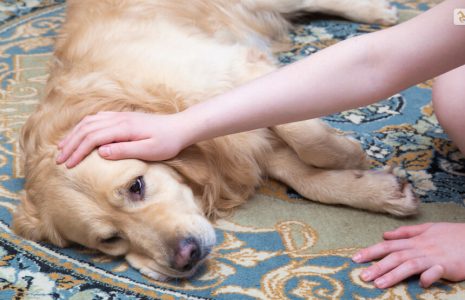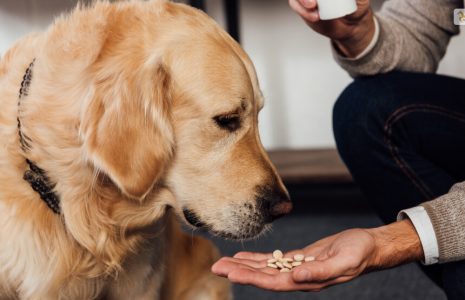Why Is My Dog Shaking And Acting Weird All Of A Sudden? Here’s How You Can Make Them Feel Better!


It can definitely be alarming to see your fur baby shaking or trembling and acting weird for no apparent reason. But don’t panic just yet – there are several possible explanations for these strange behaviors, and most are not cause for serious concern.
Changes in routine, anxiety, illness, pain, or even just old age can trigger temporary changes in a dog’s behavior and mood. The good news is there are things you can do at home to help comfort and reassure your pup. Understanding the underlying cause will help you get your four-legged family member back to their usual happy self in no time.
In this article, we will explore the common and serious causes responsible for dogs shaking, trembling, and acting weird.
Common Causes for Dog Shaking and Acting Weird

Your furry friend could be shaking and acting strangely for a few reasons.
They’re cold or excited: If they just came inside from outside or are eager to go for a walk, shaking is normal. Give them a blanket or toy to play with to help them relax.
They’re feeling anxious or scared: Loud noises, strangers, separation from you can cause anxiety in dogs. Reassure them with your calm presence, gentle petting and speaking in a soft, comforting tone.
They ate something toxic: If they got into the trash or medications, poisonous foods or plants, call your vet right away as shaking can be a symptom of poisoning.
They’re in pain: As dogs age, conditions like canine cognitive dysfunction or arthritis can develop, causing discomfort that leads to shaking. See your vet to help make them more comfortable in their golden years.
They have a tremor syndrome: Some breeds are prone to essential tremor or tremors caused by a liver condition. While usually not life-threatening, your vet can determine if medication or diet changes may help reduce episodes.
Instead of panicking, stay calm and determine the possible cause of your dog’s shaking and weird behavior. Reassuring them, keeping them warm and consulting your vet if symptoms persist are the best ways to help your faithful friend feel like themselves again.
Medical conditions responsible for dog shaking and acting weird

One of the most common medical reasons for strange behavior and shaking in dogs is pain or discomfort. If your dog is acting weird all of a sudden, they may have an underlying health issue that’s causing them distress.
Pain or Injury
Your dog could be shaking or acting strange due to an injury like muscle strain or a broken bone. Dogs instinctively hide pain, so subtle behavioral changes may be the only sign of an injury or condition causing them discomfort. Check your dog for any tender areas or swelling, especially if they were playing rough earlier. If the shaking and strange behavior started after an accident or fall, have your vet examine them as soon as possible.
Other possible medical causes for your dog shaking and acting peculiar include:
•Nervous system disorders: Conditions like epilepsy or canine cognitive dysfunction syndrome can cause tremors, confusion and behavior changes in dogs.
•Poisoning or toxin exposure: If your dog ate something they shouldn’t have, it may be causing a bad reaction. Look for other symptoms like vomiting, diarrhea or lethargy and call your vet or animal poison control immediately.
•Underlying illness: Medical issues such as infections, hormonal imbalances or organ disease can also lead to shaking, anxiety and odd behavior in dogs. It’s best to have your vet examine your dog to determine if any testing or treatment is needed.
The bottom line is if your dog is acting weird and shaking for no apparent reason, it’s a good idea to have them checked out by the vet. While the cause may be something minor, it’s always better safe than sorry when it comes to your canine companion’s health.
Dog Shaking and acting weird: When should you worry?

If your dog is suddenly shaking, pacing, or acting strange, it could signal an underlying issue that requires veterinary attention. Some signs to watch out for include:
Uncontrollable shaking or tremors:
If your dog can’t seem to stop trembling, it could indicate poisoning, neurological issues, or other medical emergencies.
Dilated pupils:
If your dog’s pupils are very large or small, it could point to a head injury or exposure to toxins.
Difficulty walking:
If your dog is stumbling, limping or seems uncoordinated, it could be a sign of pain, injury or illness.
Aggression or hiding:
If your friendly dog is snarling, snapping or hiding from you, they may be in pain, fearful or not feeling well.
Refusing food or water:
If your dog hasn’t eaten or had anything to drink for 24 hours, it could lead to dehydration or other issues and requires immediate vet care.
When in doubt, it’s always best to have your vet examine your dog to determine the cause of their symptoms and recommend appropriate treatment. While shaking and strange behavior can sometimes be due to anxiety, stress or excitement. It’s not worth the risk of missing a serious medical issue. Your vet can check for problems and help get your dog back to their usual happy, healthy self.
Final Thoughts!
In the end, the cause of your dog’s strange behavior is likely one of a few possibilities. It could be a medical issue, like pain, illness or a reaction to something they ate. Dogs can’t tell us what’s wrong, so odd behavior may be their way of signaling that something’s amiss. It’s best to have your vet examine them to rule out any medical causes.
Sometimes stress or anxiety leads to shaking and weird behavior in dogs. Loud noises, being left alone, trauma, or a change in routine could trigger anxiety in your pet. Reassuring them, sticking to a routine, and providing a safe space may help. You can also ask your vet about anxiety medication or behavioral therapy. With medication and some extra TLC, your dog will get back to their usual happy self again soon!








Leave A Comment